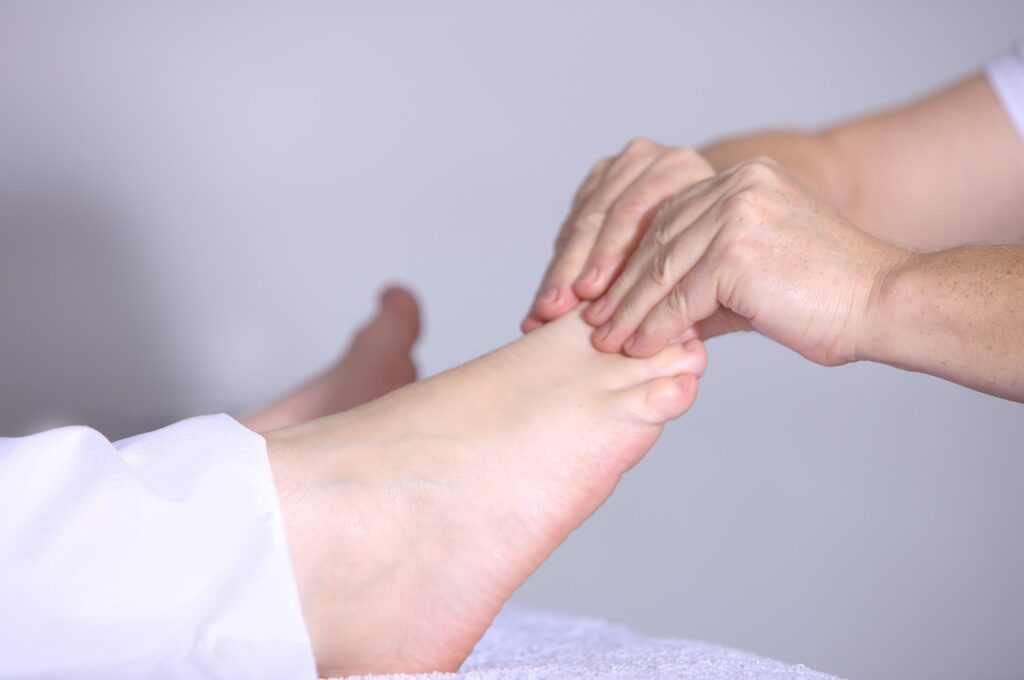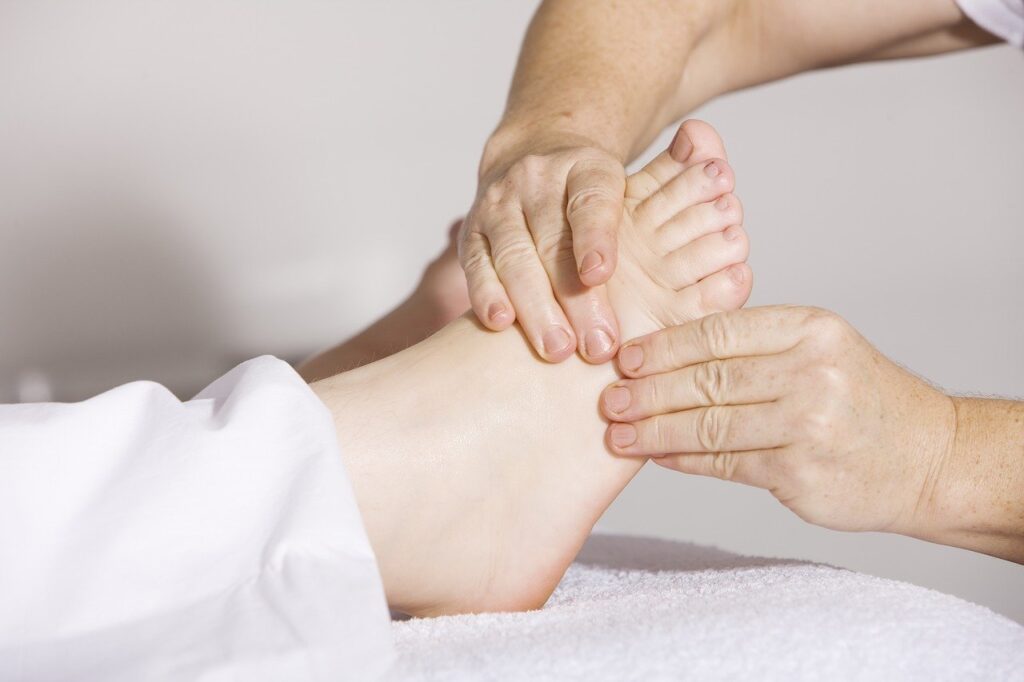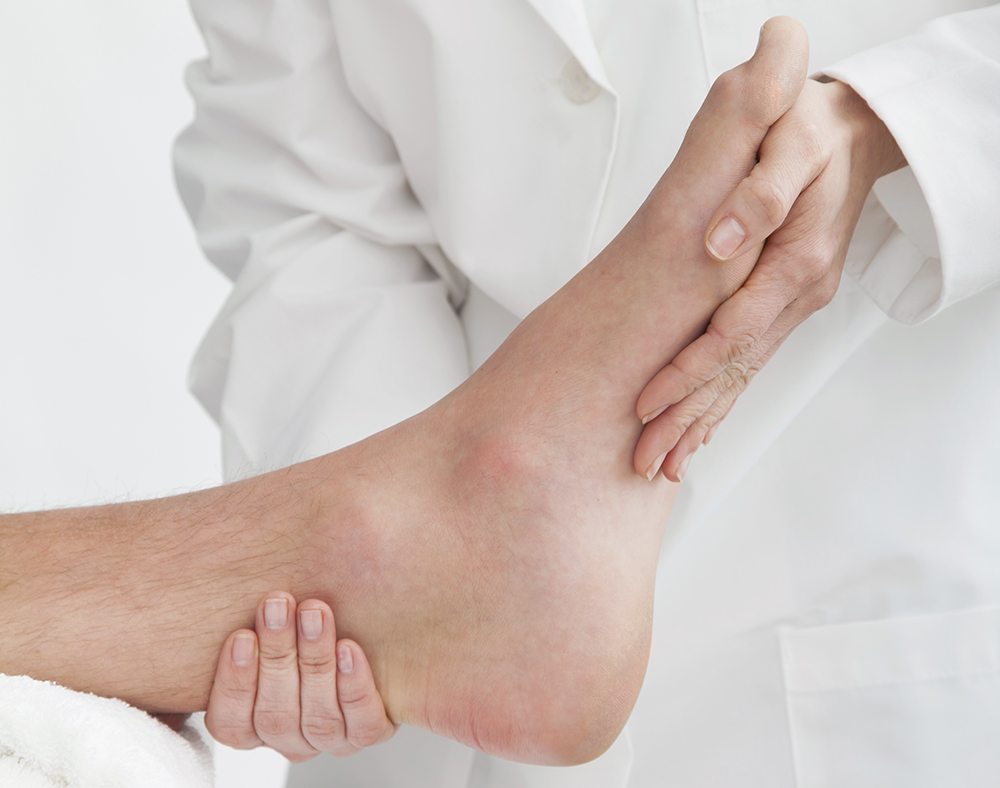Heel Pain Treatment
Causes And Treatment Of Heel Pain
Heel pain is one of the most common foot problems, and it can be experienced by people of all ages and walks of life. Whether it’s a consistent dull ache or a sharp pain when you step on it, heel pain can make the most basic of tasks very difficult. At Jakupi Podiatry, we strive to understand the cause of the discomfort so we can provide comprehensive heel pain treatment, helping you feel better sooner. We’re here to help you identify the cause of your heel pain, provide treatment, and give you a few tips on preventing heel pain in the future.

What Causes Heel Pain?
There are many causes of heel pain, and to make sure we find the right treatment, we need to identify what’s causing your discomfort. Here are some of the most common causes of heel pain we see at Jakupi Podiatry.
- Plantar fasciitis. The plantar fascia is the thick band of tissue running across the bottom of your foot, connecting your heel bone to your toes. The plantar fascia is in the shape of a bowstring, and it supports the arch of your foot, supporting shock when you walk. If there is too much stress or tension, small tears can occur in the fascia, causing irritation and inflammation.
- Abnormal walking style. When a person rolls their feet inwards or puts more weight on one foot, it can cause heel pain over time. Chronic inflammation caused by an abnormal walking style can lead to the development of a bony growth called a spur.
- Sprains and strains. These injuries are most commonly caused by physical activity and can range from minor to severe. A sprain is the stretching or tearing of the ligaments, whereas a strain is the stretching or tearing of the muscle or tendons.
- Obesity. When an individual is unhealthily overweight, over time, there is a lot of strain on their heels, ankles, and knees, causing aches and pains.
- Fractures and breaks. Trust us when we say you’ll know all about it if you fracture your heel. It is incredibly painful, and most people find it excruciating to walk on. A fracture or break is a medical emergency, and you’ll need to find urgent care.
- Ill-fitting shoes. Poor quality or ill-fitting shoes can wreak havoc on your feet, ankles, knees, and lower back. You need to invest in footwear that supports your feet and ankles. If you’re struggling to find the right shoes, speak to a podiatrist.
- Achilles tendonitis. When the tendon attaching the calf muscles to the heel is injured or repeatedly strained, it becomes painful or inflamed, causing Achilles tendonitis.
- Standing, running, or jumping on hard surfaces. Your heels bear a lot of your weight, and hard surfaces may cause bruising or strain over time.
- Bursitis. Bursae are fluid-filled sacs found around your joints where tendons, skin, and muscle tissue meets the bone, and they can be pretty painful if left untreated.
- Sever’s disease. This is the most common cause of heel pain in children aged eight to 16. An excessive amount of running or jumping causes inflammation on the growth plate of the heel bone.
- Ankylosing spondylitis. This common form of arthritis affects the spine and causes severe inflammation of the vertebrae.
- Haglund’s deformity. An enlargement of the bony section of the heel (near the Achilles tendon) triggers this abnormality of the bone and soft tissue in the foot. The soft tissue at the back of the heel can become irritated when the bony lump rubs against rigid shoes.
- Osteochondroses. Typically affecting children and adolescents, osteochondroses affect the growth of bones.
- Reactive arthritis. This type of arthritis is triggered by an infection in the body and can cause heel pain.
How To Treat Heel Pain
If you’re looking for heel pain treatment in Melbourne, the team of experts at Jakupi Podiatry are here to help. You can do a few things before visiting a podiatrist; however, if the pain persists, you need to get a professional medical opinion.
- Rest your heel. If you continue to put strain and pressure on your injured or sore heel, it will only become worse. Rest it as much as you can, and try to keep your foot elevated to just above your heart to reduce swelling.
- Apply ice. Use a cold compress or ice for 10-15 minutes twice a day to see if it works to reduce swelling and pain.
- Take over-the-counter pain medications. Ibuprofen will help to reduce pain and inflammation, and paracetamol will reduce pain alone. If you need stronger medication, make sure you see your GP or podiatrist.
- Regular massage. If you organise regular massage appointments that focus on the foot’s arch, you may find it relieves your pain over time.
- Wear a night splint. Your podiatrist may suggest you wear a night splint while you sleep, keeping your foot at a 90-degree angle. This helps to stretch the Achilles tendon and plantar fascia, preventing shortening and pain.
- Physical therapy. Your podiatrist may recommend a tailored physical therapy program to improve the strength and flexibility of your foot, heel, and ankle.
- Surgery. In very rare circumstances, your podiatrist may recommend surgery. However, heel surgery often requires a long recovery time, so this is the last resort.


How To Prevent Heel Pain
- Correct your posture. Walking style and posture often contribute to foot and heel pain, so work with your podiatrist and a chiropractor to correct these issues.
- Wear shoes that support your heels. Your choice of footwear is important in preventing heel injury or pain. Consult with your podiatrist on footwear, inserts, or heel lifts that will support your whole foot, ankle, and back. If you play sport or work out regularly, make sure you’re wearing the correct footwear for that activity.
- Always prepare yourself before working out/playing sport. Make sure you do plenty of warm-up stretches before engaging in any physical activity that may cause an impact on your heels. If it’s necessary, you may also need to strap or tape your feet to support the muscles and ligaments.
- Pace yourself during physical activity. Listen to your body and take your time when working out or playing sport. If your body is telling you to rest or stop for the day, listen to it. Don’t play through the pain; it’ll only make things worse.
- Maintain a healthy weight. If your weight is contributing to your foot, ankle, or knee pain, you need to consult with a doctor to find a solution that works for you.
If You Need Heel Pain Treatment, Book An Appointment With Jakupi Podiatry
We’re the experts in all things podiatry, offering patients an extensive range of quality medical services, including paediatrics, custom orthotics, general podiatric skin and nail care, nail surgery, stretching & strengthening, sports podiatry and diabetes foot assessments. So if you’re after friendly and efficient services regarding all your foot and ankle care needs, look no further than Jakupi Podiatry.
